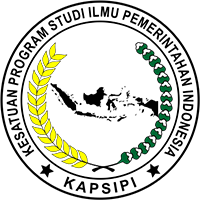First-Time Voters and Social Media
Exploring Factors Shaping Political Preferences
DOI:
https://doi.org/10.35967/njip.v24i1.791Keywords:
First-Time Voters, Social Media, Political Preferences, political participation, Digital EraAbstract
This study aims to investigate the factors influencing the political preferences of first-time voters (Gen Z) in the digital landscape, emphasizing the role of social media as a campaign tool and source of political information. A quantitative approach was adopted through a survey of 206 first-time voters in Pekanbaru. The collected data were statistically analyzed to identify correlations between the intensity of social media use, types of platforms, and shifts in political preferences. The findings reveal that social media is the primary source of political information (80% of respondents), with TikTok and Instagram being the most utilized platforms. Key factors influencing political preferences include (1) creativity in campaign content (55%), (2) responsiveness to current issues (40%), and (3) the impact of misinformation (30%). Candidates' vision and mission were the top consideration (85%), followed by experience (70%) and leadership qualities (65%). Approximately 30% of respondents changed their preferences after exposure to social media, while 70% maintained their initial choices due to emotional connections or shared values. This research significantly contributes to the understanding of digital political communication by illustrating the shift from traditional campaigns to visual content-based strategies. The findings also offer recommendations for the election commission and political parties to design data-driven campaigns.
enhance voter media literacy, and address misinformation challenges. Theoretically, this study expands the concepts of digital political participation and selective exposure theory within the context of Indonesia's digital democracy.
Downloads
References
Ajzen, I. (1991). The theory of planned behavior. Organizational Behavior and Human Decision Processes, 50(2), 179–211. https://doi.org/10.1016/0749-5978(91)90020-T
Alhabash, S., & Park, M. J. (2021). Uses and gratifications of social media: A meta-analysis of motivations, satisfaction, and social capital. International Journal of Communication, 15, 4743–4764. https://?oc.org/index.php/?oc/
Allcott, H., & Gentzkow, M. (2017). Social media and fake news in the 2016 election. Journal of Economic Perspectives, 31(2), 211–236. https://doi.org/10.1257/jep.31.2.211
Andriyendi, D. O., S, N., & Dewi, S. F. (2023). Media sosial dan pengaruhnya terhadap partisipasi politik pemilih pemula pada Pilkada. Journal of Education, Cultural and Politics, 3(1), 101–111. https://doi.org/10.24036/jecco.v3i1.172
Arceneaux, K., Johnson, M., & Ruth, F. (2020). Changing minds or changing channels: Partisan news in an age of choice (University of Chicago Press (ed.)). https://doi.org/https://doi.org/10.1002/polq.12243
Barokah, F., Maryanah, T., Darmastuti, A., & Hertanto, H. (2022). Disrupsi Politik. Nakhoda: Jurnal Ilmu Pemerintahan, 21(1), 1–13. https://doi.org/10.35967/njip.v21i1.273
Downs, A. (1957). An economic theory of democracy (T. University (ed.)). Elihu Katz, J. G. B. and M. G. (1974). The Uses of mass communications: current perspectives on gratifications research. Beverly Hills: Sage Publications.
Firdaus, F. (2020). Pengaruh Political Efficacy Dan Social Identity Terhadap Civic Duty To Vote. Biopsikososial: Jurnal Ilmiah Psikologi Fakultas Psikologi Universitas Mercubuana Jakarta, 4(2), 278. https://doi.org/10.22441/biopsikososial.v4i2.9988
Gordon, S. C., Huber, G. A., & Landa, G. F. (2017). Toward a theory of motivated reasoning in politics. The Journal of Politics, 79(1), 185–200.
Hadi, A. P. (2019). Pengaruh digital marketing dan brand image terhadap keputusan pembelian produk fashion pada e-commerce di kalangan generasi Z. Jurnal Manajemen Dan Bisnis, 16(2), 121–134.
Hasanuddin, H., Rizaldi, A., Marta, A., & Ishak, I. (2021). Kesenjangan Angka Partisipasi Pemilih. Nakhoda: Jurnal Ilmu Pemerintahan, 20(2), 37–45. https://doi.org/10.35967/njip.v20i2.219
Lestari, S. I. (2023). Regional Elections and Opportunities for the Political Phenomenon of Dynasty in Expansion Areas: A Case Study of Pesisir Barat District Pilkada dan Peluang Fenomena Politik Dinasti di Wilayah Pemekaran: Studi Kasus Kabupaten Pesisir Barat. Nakhoda: Jurnal Ilmu Pemerintahan, 23(1), 63–72. https://doi.org/https://doi.org/10.35967/njip.v23i1.669
Mudjiyanto, B., Tawaang, F., Nugroho, A. C., Lusianawati, H., & Launa. (2022). Disonansi Kognitif Elite Politik dan Pejabat Publik Dalam Menghadapi Fenomena Kelangkaan Minyak Goreng. Journal of Political Communication and Media, 1(1), 1–23.
Noelle-Neumann, E. (1974). The Spiral of Silence A Theory of Public Opinion. Journal of Communication, 24(2), 43–51. https://doi.org/10.1111/j.1460-2466.1974.tb00367.x
Reza, M., & Amanda, D. (2024). Pengaruh Media Sosial Facebook Pada Penyebaran Informasi Hoaks Terhadap. Journal Of Social Science Research, 4, 19139–19149. https://j-innovative.org/index.php/Innovative
Riadi, H. A. M., Pinontoan, D. P., Huzna, A. N., & Fitroh. (2022). Systematic Literature Review: Peran Digital Influencer Terhadap Digital Marketing. Jurnal Sains Pemasaran Indonesia, 21(2),283–300. https://ejournal.undip.ac.id/index.php/jspi/article/view/46898%0A
R?al, M., Aziz, F., & Lestari, P. A. (2024). Pengembangan Platform Kampanye Digital Interaktif Menggunakan Metode Rapid Application Development: Studi Kasus relawandj.id. Indonesian Journal of Intellectual Publication, 5(1), 51–58. https://doi.org/10.51577/?ipublication.v5i1.597
Robi Ulzikri, A., Cahyadi Kurniawan, R., & Indrajat, H. (2021). Budaya Politik Warga Nahdlatul Ulama Kota Bandar Lampung. Nakhoda: Jurnal Ilmu Pemerintahan, 20(1), 1–16. https://doi.org/10.35967/njip.v20i1.108
Downloads
Published
How to Cite
Issue
Section
License
Copyright (c) 2025 Authors

This work is licensed under a Creative Commons Attribution-NonCommercial-ShareAlike 4.0 International License.





